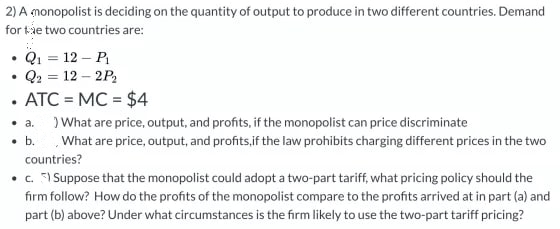2) A monopolist is deciding on the quantity of output to produce in two different countries. Demand or the two countries are: . Q₁ = 12 - P₁ . Q2 = 12 - 2P₂ • ATC=MC = $4 . .a. What are price, output, and profits, if the monopolist can price discriminate .b. What are price, output, and profits,if the law prohibits charging different prices in the two countries? c.) Suppose that the monopolist could adopt a two-part tariff, what pricing policy should the firm follow? How do the profits of the monopolist compare to the profits arrived at in part (a) and part (b) above? Under what circumstances is the firm likely to use the two-part tariff pricing?
2) A monopolist is deciding on the quantity of output to produce in two different countries. Demand or the two countries are: . Q₁ = 12 - P₁ . Q2 = 12 - 2P₂ • ATC=MC = $4 . .a. What are price, output, and profits, if the monopolist can price discriminate .b. What are price, output, and profits,if the law prohibits charging different prices in the two countries? c.) Suppose that the monopolist could adopt a two-part tariff, what pricing policy should the firm follow? How do the profits of the monopolist compare to the profits arrived at in part (a) and part (b) above? Under what circumstances is the firm likely to use the two-part tariff pricing?
Managerial Economics: A Problem Solving Approach
5th Edition
ISBN:9781337106665
Author:Luke M. Froeb, Brian T. McCann, Michael R. Ward, Mike Shor
Publisher:Luke M. Froeb, Brian T. McCann, Michael R. Ward, Mike Shor
Chapter14: Indirect Price Discrimination
Section: Chapter Questions
Problem 4MC
Related questions
Question
Please solve all three

Transcribed Image Text:2) A monopolist is deciding on the quantity of output to produce in two different countries. Demand
for the two countries are:
• Q₁ = 12 - P₁
Q2 = 12 - 2P₂
.
ATC=MC = $4
.
• a.
) What are price, output, and profits, if the monopolist can price discriminate
. b. What are price, output, and profits, if the law prohibits charging different prices in the two
countries?
• c. 5) Suppose that the monopolist could adopt a two-part tariff, what pricing policy should the
firm follow? How do the profits of the monopolist compare to the profits arrived at in part (a) and
part (b) above? Under what circumstances is the firm likely to use the two-part tariff pricing?
Expert Solution
This question has been solved!
Explore an expertly crafted, step-by-step solution for a thorough understanding of key concepts.
Step by step
Solved in 3 steps

Knowledge Booster
Learn more about
Need a deep-dive on the concept behind this application? Look no further. Learn more about this topic, economics and related others by exploring similar questions and additional content below.Recommended textbooks for you

Managerial Economics: A Problem Solving Approach
Economics
ISBN:
9781337106665
Author:
Luke M. Froeb, Brian T. McCann, Michael R. Ward, Mike Shor
Publisher:
Cengage Learning



Managerial Economics: A Problem Solving Approach
Economics
ISBN:
9781337106665
Author:
Luke M. Froeb, Brian T. McCann, Michael R. Ward, Mike Shor
Publisher:
Cengage Learning





Principles of Economics 2e
Economics
ISBN:
9781947172364
Author:
Steven A. Greenlaw; David Shapiro
Publisher:
OpenStax